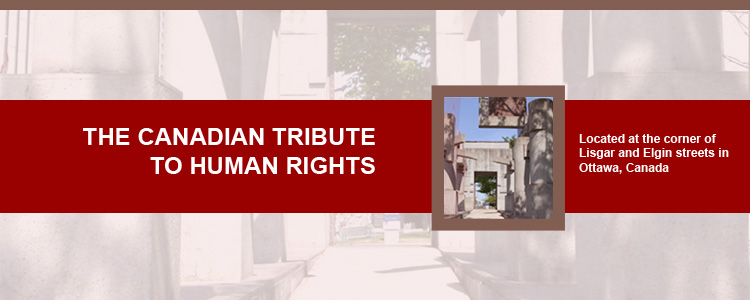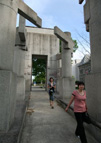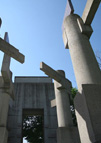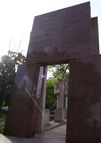
|
|
|
|
|
|
|
|
 |
|||||||||||||
|
|||||||||||||

|
What Motivates Our SupportersThe contributions of individuals, groups, churches, labour unions, businesses and governments have built the Canadian Tribute to Human Rights. The total cost of the initial construction, $866,000, included the cost of a national design competition. Tens of thousands of Canadians have been involved in the project, from the two Ottawa girls who put a symbolic spade into the ground in November 1988 to the miners of the Seven Sisters granite mine at Lac Dubonnet, Manitoba. Donations of funds and services came from across the country, from the hamlet of Azilda, Ont. to the city of Chateauguay, Que., from Yellowknife, the capital of the Northwest Territories, to Goose Bay in Labrador. Among the contributors are a 90-year-old resident of an Ottawa senior citizens home, as well as a Toronto disabled man who requested donations to the Tribute instead of gifts at his birthday party; his contribution was then matched by his employer. “The size of my contribution bears no relation to my respect for the cause,” explained D.L Bishop, of Ottawa when she sent in a contribution. Many donors were motivated by the memory of those who have suffered or died in the struggle for human rights. Kingston, Ontario also sent a contribution. Mayor Helen Cooper wrote that the Canadian Tribute to Human Rights is an important national symbol because “it uplifts us and raises us from our everyday problems and issues; it makes us think and contribute to a much broader vision.” What are these human rights which the Canadian Tribute symbolizes and which we so urgently struggle to establish and strengthen? Everyone has the right to be free of war and the fear of war and violence. Freedom from want is essential: the rights to food, warmth, shelter, employment and love. We have the right to live as we see fit: to think, decide and choose for ourselves, to be ourselves, providing we do not harm or deny freedom to other people. We need freedom of expression and language, freedom of religion, freedom of association. The Canadian Tribute to Human Rights resonates first and foremost among peoples with long histories of fighting human rights abuses, people who have struggled for the basic right to security of the person, language and culture, dignified and equal treatment, decent housing or employment. Among the Tribute’s earliest supporters were aboriginal, francophone, labour, ethno-cultural, lesbian and gay, religious, exiled and refugee, and humanitarian groups. Donor Recognition |
   
|
|
|